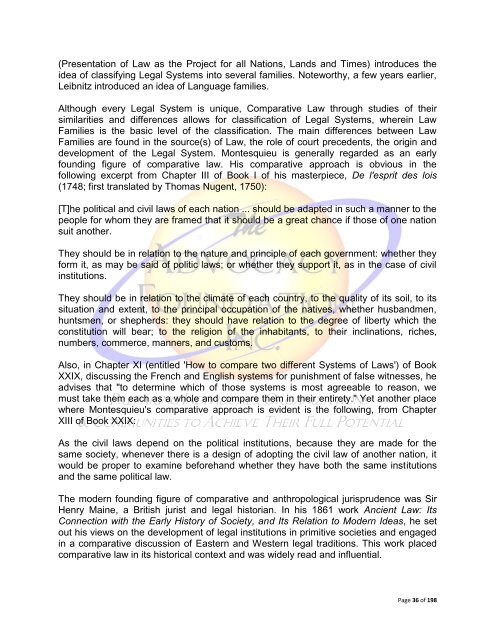International Law & Justice
International Law & Justice
International Law & Justice
Create successful ePaper yourself
Turn your PDF publications into a flip-book with our unique Google optimized e-Paper software.
(Presentation of <strong>Law</strong> as the Project for all Nations, Lands and Times) introduces the<br />
idea of classifying Legal Systems into several families. Noteworthy, a few years earlier,<br />
Leibnitz introduced an idea of Language families.<br />
Although every Legal System is unique, Comparative <strong>Law</strong> through studies of their<br />
similarities and differences allows for classification of Legal Systems, wherein <strong>Law</strong><br />
Families is the basic level of the classification. The main differences between <strong>Law</strong><br />
Families are found in the source(s) of <strong>Law</strong>, the role of court precedents, the origin and<br />
development of the Legal System. Montesquieu is generally regarded as an early<br />
founding figure of comparative law. His comparative approach is obvious in the<br />
following excerpt from Chapter III of Book I of his masterpiece, De l'esprit des lois<br />
(1748; first translated by Thomas Nugent, 1750):<br />
[T]he political and civil laws of each nation ... should be adapted in such a manner to the<br />
people for whom they are framed that it should be a great chance if those of one nation<br />
suit another.<br />
They should be in relation to the nature and principle of each government: whether they<br />
form it, as may be said of politic laws; or whether they support it, as in the case of civil<br />
institutions.<br />
They should be in relation to the climate of each country, to the quality of its soil, to its<br />
situation and extent, to the principal occupation of the natives, whether husbandmen,<br />
huntsmen, or shepherds: they should have relation to the degree of liberty which the<br />
constitution will bear; to the religion of the inhabitants, to their inclinations, riches,<br />
numbers, commerce, manners, and customs.<br />
Also, in Chapter XI (entitled 'How to compare two different Systems of <strong>Law</strong>s') of Book<br />
XXIX, discussing the French and English systems for punishment of false witnesses, he<br />
advises that "to determine which of those systems is most agreeable to reason, we<br />
must take them each as a whole and compare them in their entirety." Yet another place<br />
where Montesquieu's comparative approach is evident is the following, from Chapter<br />
XIII of Book XXIX:<br />
As the civil laws depend on the political institutions, because they are made for the<br />
same society, whenever there is a design of adopting the civil law of another nation, it<br />
would be proper to examine beforehand whether they have both the same institutions<br />
and the same political law.<br />
The modern founding figure of comparative and anthropological jurisprudence was Sir<br />
Henry Maine, a British jurist and legal historian. In his 1861 work Ancient <strong>Law</strong>: Its<br />
Connection with the Early History of Society, and Its Relation to Modern Ideas, he set<br />
out his views on the development of legal institutions in primitive societies and engaged<br />
in a comparative discussion of Eastern and Western legal traditions. This work placed<br />
comparative law in its historical context and was widely read and influential.<br />
Page 36 of 198

















